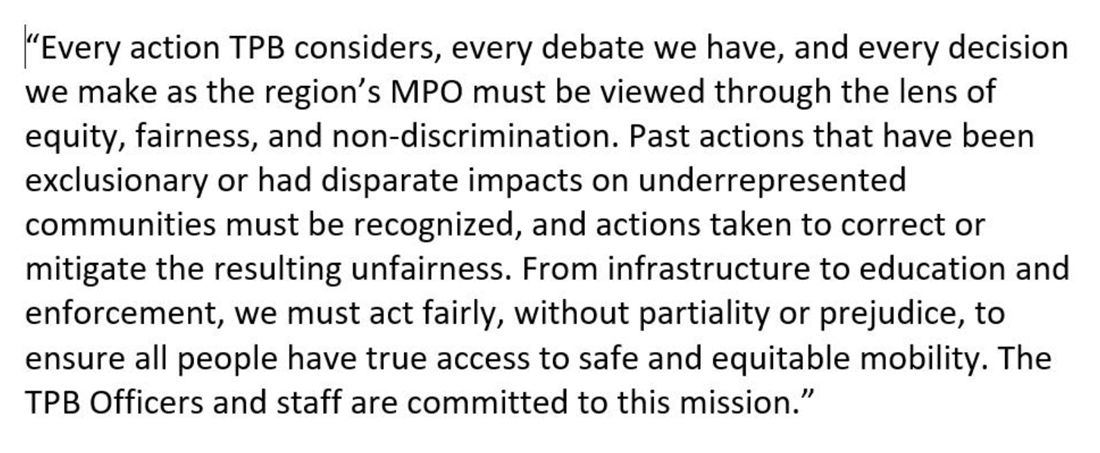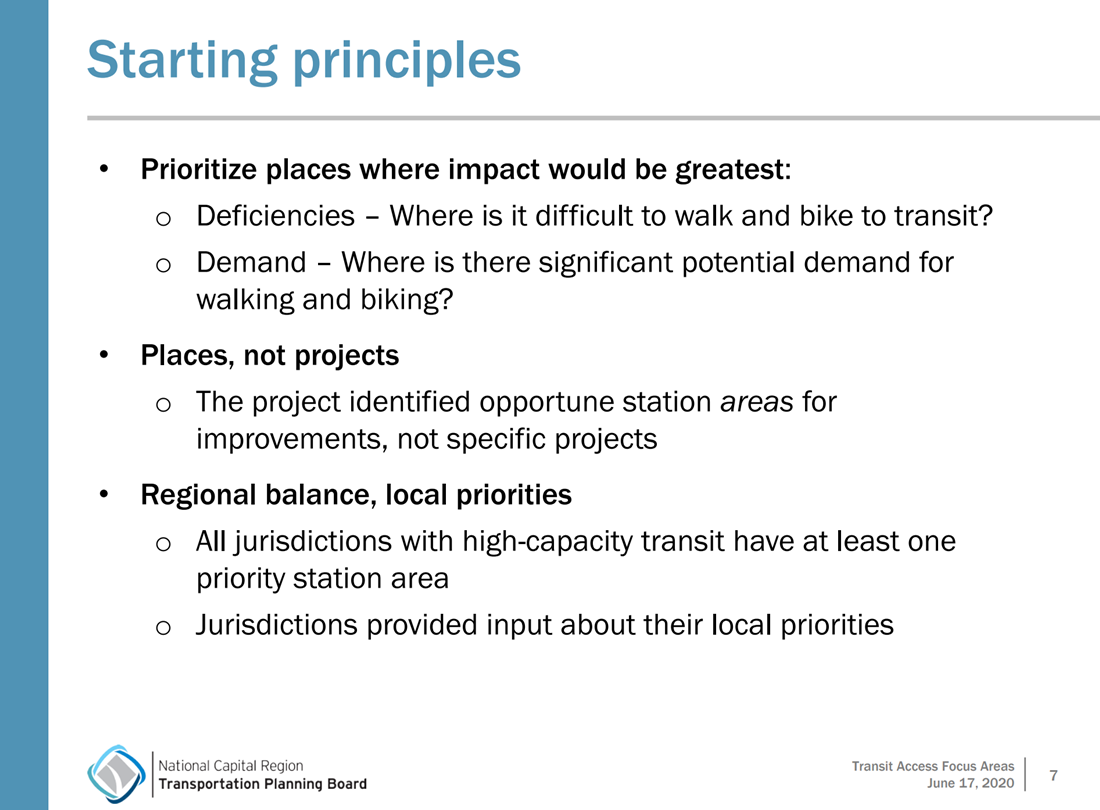At its June meeting, the TPB held a robust discussion focused on equity and safety regarding a draft of recommendations from the Regional Safety Study. The recommendations themselves encompass a range of interventions that would address the most common factors that contribute to serious injuries or deaths on our roadways. They range from strategies to encourage safer behavior to infrastructure improvements to regional policy programs.
Also at the June meeting, the TPB received briefings on two work products that have come directly from the TPB’s aspirational initiatives, an element of Visualize 2045, the 2018 long-range transportation plan. The first product is a list of Transit Access Focus Areas that identify areas near high capacity transit that have the most potential to improve walk and bike access to transit. The other is the National Capital Trail Network, an outgrowth of the National Capital trail that has been expanded into a regional network.
A Statement on Equity
In her Chair’s remarks, TPB Chair Kelly Russell took a moment to talk about her thoughts on equity after the protests in response to police killings of Black people. In her remarks, Chair Russell talked about the importance of equity in all the work that we do. She noted that while we still have more we can do; we need to look at transportation through the equity lens. Watch and listen to the Chair's remarks.
The Safety Discussion
Chair Russell’s focus on equity continued within the discussion of the draft safety recommendations. TPB Transportation Planner Jon Schermann started off by reviewing the Regional Safety Study. He recounted that it began at the board’s request and reviewed some of its findings. He explained that the study examined the factors that contribute to deaths and serious injuries in roadway crashes. Next, he reviewed the various recommendations and went over the four different parts that will be part of the proposed TPB resolution.
In the first part of the proposed resolution the TPB urges its members to reaffirm their commitment to roadway safety as a top priority and furthermore to take actions to increase seat belt use, reduce speeding, reduce impaired driving, and reduce distracted driving. Making progress on these four behaviors would result in fewer crashes and also make the crashes that do happen less devastating. In the second part, the TPB urges its members to commit to working individually and/or collectively to implement the broad range of safety measures developed as part of the study. About 50 recommended safety measures are identified in this part and are described in an attachment to the resolution. In the third part the TPB would establish a Regional Roadway Safety Program which would be funded by the TPB with assistance from member state DOTs. This program would provide assistance to member jurisdictions as they work to improve safety and also help the region implement projects, programs or policies to improve safety outcomes for all roadway users. The fourth part calls upon TPB member jurisdictions and agencies to adopt equitable Vision Zero policies and develop local roadway safety plans and ensure their equitable impacts on all roadway users. It also calls upon its member states to adopt primary seatbelt legislation and increase the use of ignition interlock devices for impaired driving offenders.
Chair Russell started off the discussion with a recommendation that the resolution the TPB will be asked to adopt, next month, in support of actions to reduce fatalities and serious crashes, include an equity statement to convey the TPB’s commitment to the matter. Providing a draft of an equity statement she said that equity considerations need to be a part of every TPB decision.

Other board members agreed with Chair Russell’s statement. Board Member Kacy Kostiuk thought the idea of adding an equity consideration as part of every TPB decision was important.
While supporting the staff recommended safety strategies, Board Vice Chair Charles Allen noted his concerns about the recommendation for states to adopt primary seat belt legislation which would enable police to pull over vehicles where seat belts are not in use. Mr. Allen noted that traffic stops “have been disproportionately used against people of color” and that the District is looking at how to reduce interactions with police. He further stated that enforcement of seatbelt laws “might be unintentionally creating interactions with law enforcement.”
Board member David Snyder noted that this safety study and its recommendations are groundbreaking work and will help the region make changes that improve safety. He also said that it is shown that wearing seatbelts, “saves lives.” Noting Mr. Allen’s comments, he added that, “I think we can make a statement in our resolution that in our policing and policies that we don’t have the kind of impacts that people are concerned about.”
The board will be taking up these safety recommendations for action at its July meeting.
Learn more about the safety recommendations.
Watch the presentation and board discussion.
Other items
Transit Access Focus Areas: Also at the June meeting two of the TPB’s aspirational initiatives focused on walking and biking reached key milestones. First, was work that came out of the initiative to improve walk and bike access to transit. Staff have identified a list of Transit Access Focus Areas or TAFAs. These are areas around high capacity transit that have been selected as priority locations for improving pedestrian and bike access to transit. The work began by looking at the walksheds around transit stations. Walksheds show how easy or hard it is to get to the station and shows what barriers exists making it harder to do so. Then TPB staff worked with member jurisdictions to identify areas with the most need and demand for better access. If approved, the TPB will expect that the TAFAs will receive priority consideration for funding by the TPB’s member jurisdictions and agencies. In addition, projects at these station areas will receive additional consideration for funding through the Transportation Land-Use Connections (TLC) program, grant funding from the Transportation Alternatives Set-Aside Program (TAP), and other potential regionally oriented funding programs and opportunities.
There were a set of key principles that went into this project:

Learn more about the Transit Access Focus Areas.
Watch to the presentation and board discussion.
National Capital Trail Network: The second initiative that reached a key milestone at the meeting was expanding the National Capital Trail. The National Capital Trail Network is a network of long-distance, off-street facilities, suitable for people of all ages and abilities. When approved, the network will be used to prioritize funding for the Transportation Alternatives Program and the Transportation Land Use Connections program. TPB staff presented a draft map of the expanded National Capital Trail Network. You can explore an interactive map of the trail network. Watch the presentation and board discussion.
Citizens Advisory Committee: CAC Chair Nancy Abeles presented the CAC report. The CAC met on June 11. The committee learn more about the draft safety recommendations and had a robust discussion about those recommendations and the study. TPB staff also presented on the update to the Participation Plan and the MARC-VRE run through study. Read the CAC report. Watch the presentation.
Access for All Advisory Committee: Board member and AFA Chair Kacy Kostiuk reported on the AFA’s June meeting. The AFA had an in-depth discussed and provided input on the update to the participation plan. The committee also discussed and learned about Connected and Autonomous Vehicles. Read the AFA report. Watch the AFA report.
Watch or listen to the June TPB meeting.
Get TPB meeting announcements, agendas, and materials sent directly to your inbox.